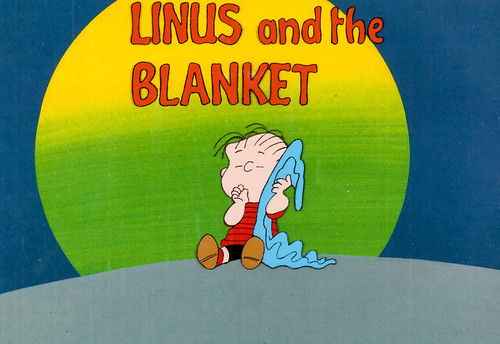7th Sunday of Easter (A)
Pictures: cc Tom Simpson & Caren Pilgrim
My dear friends, do you know who Linus van Pelt is? Does the name ring a bell for you at all? Some of us may remember that Linus is a character from the comic strip Peanuts. He’s the kid who’s usually seen holding a blanket to his cheek, while sucking his thumb. Do you know why Linus does this? Why he relies so much on his blanket and on his thumb?
I’m not sure. But I imagine it’s probably the same reason why parents place pacifiers in their babies’ mouths. Or a pillow by their side. Or, these days, if the child is a little older, a smartphone in its hands. Parents do this usually when the child is crying for attention, and the parents are too busy to see to it immediately. The thumb and the blanket, the pacifier, the pillow, and the phone, are all handy substitutes for what the child really wants: parental attention and affection. Linus and his blanket gives us a convenient image of our usual approach to coping with absence. How do I usually react when something I want is missing? Well, I simply try to substitute it with something else.
But what happens if what I really want, what I’m actually looking for, what I absolutely cannot live without, is God? God’s attention and affection, God’s presence and action, in my life. And what if, for some reason, I cannot seem to find it? Or do not know how? Perhaps I’m not aware of ever having experienced it before. Or, having experienced it before, I now seem to have lost it. What to do? How to react when God’s absence leaves a huge hole in my heart. A deep hunger and a burning thirst that cries out for satisfaction. How do I cope with God’s apparent absence in my life?
The usual reaction is, of course, that of Linus. I try to replace God with someone else. Or something else. Like a friend or a spouse. A car or a handbag. A career or even a ministry. I spend my life seeking wealth and success, luxury and comfort, popularity and affirmation… All of which, of course, doesn’t get me very far. For one thing, this kind of attempt at substitution also goes by another name. It’s called idolatry. The sin of worshipping false gods. And not only is idolatry a sin, we also believe that it is always doomed to fail. For, as St. Augustine puts it so well, you have made us for yourself, O God, and our hearts are restless until they rest in you…
So, if substitution doesn’t work, what else can I do? How else can I cope with the apparent absence of God in my life? When I’m feeling lonely and depressed, restless and confused, lost and abandoned. This, my dear friends, is the question that our prayers and readings help us to ponder, on this second last Sunday of the Easter Season. This is probably what the friends and family of Jesus, including Mary his mother, are grappling with in the first reading. For, at this point in the story, Jesus has just been taken up into heaven. He is no longer present to his disciples in the same way that he was before. So what do they do? How do they cope with his absence?
Rather than trying to replace the Lord with something or someone else. Instead of immediately rushing off to distract themselves with some other form of anxious activity. We’re told that they first engage in a particular process. They come together in the upper room, and they join in continuous prayer. Now we’re not told exactly how they pray. What words they utter. What songs they sing. But we can perhaps imagine what sentiments they must be expressing.
For isn’t it likely that their prayer is very similar to what we ourselves offered earlier in our Collect or opening prayer? We begged God to allow us to experience… until the end of the world, the Saviour’s abiding presence among us… Isn’t it likely that this was their prayer too? A prayer to experience the Lord’s abiding presence, even in the face of his apparent absence? A prayer offered not just to fulfil an empty obligation. But one that springs from the same deep hunger and burning thirst expressed so beautifully in the responsorial psalm. There is one thing I ask of the Lord, for this I long, to live in the house of the Lord, all the days of my life…
And we know, of course, the result of this prayer in the first reading. It results in the feast we will celebrate next Sunday: Pentecost. The heartfelt prayer is answered. The Holy Spirit descends, like a mighty wind and a great ball of fire, upon those privileged people gathered in the upper room. Giving them all a renewed experience of God’s powerful presence.
And yet, my dear friends, I’m not sure about you, but there is something about that spectacular scene that sometimes makes me feel a little discouraged. For how often can I claim to experience God in such a dramatic, earth-shattering way? Thankfully, our other readings show us a broader view. In the second reading, we’re told that God’s presence is felt not just by those who experience spectacular success. But also by those who encounter painful failure. Especially by those who suffer for being a Christian. As our brothers and sisters of the Coptic Church in Egypt are currently suffering. For it is a blessing for you when they insult you–or throw bombs and spray bullets at you–for bearing the name of Christ, because it means that you have the Spirit of glory, the Spirit of God resting on you. You are experiencing the presence of God.
The same presence that Jesus talks about in his prayer to his Father in the gospel. The same glory that, in John’s gospel, is most clearly seen when Jesus hangs dead on the Cross. To be able to recognise God’s glorious presence even and especially in the sufferings that one may have to endure for being a Christian. To accept ridicule, for example, for refusing to run the rat race. Or for insisting on treating others kindly, even when we know they will take advantage of our kindness. For Jesus, this is nothing less than eternal life. To know the one true God, and Jesus Christ whom God has sent.
This, my dear friends, is how we Christians are to respond when God seems absent. Instead of anxiously looking for substitutes, we are to immerse ourselves together in prayer. As we are doing here at this Mass. Prayer that leads eventually to recognition. A renewed sense of God’s powerful presence. This is the truly Christian way of responding to the trials of life.
My dear sisters and brothers, how are you being called to move from clinging anxiously to security blankets to praying together in the upper room today?


No comments:
Post a Comment